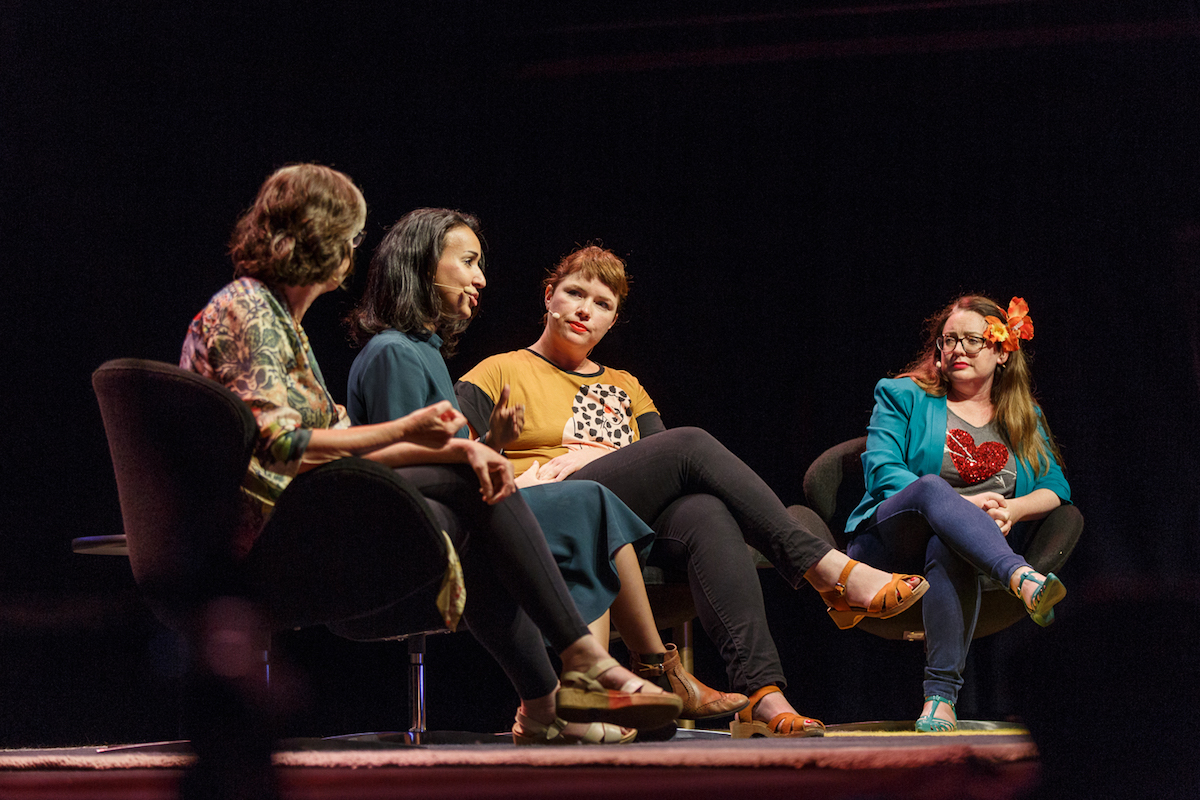All About Women, curated by ABC’s Big Ideas founder and former TEDxSydney Head of Curation Edwina Throsby, returned to Sydney in March, holding talks and events on all things gender, equality and justice. It featured live podcasts, gin distilling lessons and a block party to close the event.
For 2018, speakers included #MeToo founder Tarana Burke; author Fran Lebowitz; and writer/actor Nakkiah Lui.
One of the discussions, ‘Smashing the Patriarchy: A practical guide’, was moderated by The Guardian columnist Van Badham; with fellow panel members including writer Clementine Ford; Saudi Arabian women’s activist and writer Manal al-Sharif; and best-selling author Barbara Kingsolver.

“Step one, get mad,” Kingsolver said, in answer to how women can dismantle the patriarchy. She added that women should use their collective anger to make a difference.
“Don’t be afraid of your own anger and don’t apologise for it,” she continued. “Let’s not forget that this is about economic disparity. It’s about exploitation.
“It is to the advantage of the wealthy to be able to exploit the labour of women; to get us to do a whole lot of stuff for free. It has always been very helpful to have half the population of the planet willing to raise kids and do all the laundry and not get paid for it.”
Al-Sharif explained that to get women’s rights you have to raise awareness to then change the consciousness of policy makers. But consciousness cannot change if the policymakers are still in denial.
“[If you] talk about women’s rights – no one is listening in Saudi Arabia,” she said. “[But] talk about women driving and everyone is listening.”
In 2011, al-Sharif decided to post a video of herself driving on YouTube, an act that was then forbidden for women in Saudi Arabia. She was later imprisoned.
Al-Sharif, who now lives in Australia, provided an alternative approach for women to take down the patriarchy.
“We are really powerful when we are ourselves,” she said, believing the patriarchy can be brought down with a respectful and forgiving approach.
“I was in jail and this cleric called for my flogging in public the day I went to drive. He came to jail to see me. He wanted to see this ‘Manal al-Sharif’,” she recounted.
“He was so mad. He was shouting at me, saying terrible things to me and I was sitting there listening to every terrible thing he said about me. And I gave him a smile and I said, ‘That’s not me’; this [women’s rights] is exactly what I’m calling for.
“When he left, he was a different person and I found out that we really gain with being patient, listening and forgiving.
“It’s more difficult to be that forgiving person. You have hate coming from the whole country for seven years and then the decree (allowing Saudi women to drive) came out and suddenly people started treating me differently.
“They didn’t have anything against me because I would always be really respectful of the culture and the people.”
This approach, however, doesn’t apply to all countries. Ford argued that it wouldn’t always work in Australia, citing writer and mechanical engineer Yassmin Abdel Magied, who was driven out of the country for questioning Australia’s immigration policies using a seven-word Facebook status.
“Yasmin up to that point, even including that status, was very polite, nice, gentle,” Ford said.
“It’s important to discuss the limitations of the charm offensive because for Yassmin it didn’t work once it became real.
“Once she started to speak honestly and openly and more forthrightly about politics, the whole country turned against her.”
What the panellists agreed on was the idea of women turning their collective anger into action.
“Anger doesn’t mean contempt,” Kingsolver said. “It just means taking hold of your energy and doing something with it.
“I believe the opposite of patriarchy is empathy. Take your anger and do something with it that will move someone into a better place, whether it’s yourself or your friend or your mother. It needs to be an engine.
Take your anger and do something with it that will move someone into a better place. It needs to be an engine.
“When I get angry, I write a novel.”
Ford, however, came at it from a different angle. She posed the question: “How do we raise boys to be part of solving that equation, of smashing the patriarchy?”
At the end of the evening moderator Badham mentioned other ways women can smash the patriarchy:
- Join a union
- Inform yourself
- Get angry and get organised
- Critique the prejudices you hold within
- Let go of the shame the patriarchy has put on you for standing up for yourself
- Get your fathers/brothers/male partners/communities to take responsibility for toxic masculinity
- Don’t just call out injustice, go out and fight for it
Want more? Irene Natividad, President of the Global Summit of Women, gives her perspective on how women can rise above the patriarchy.
Plus, 10 of the most inspiring and thought-provoking quotes for International Women’s Day 2018.







